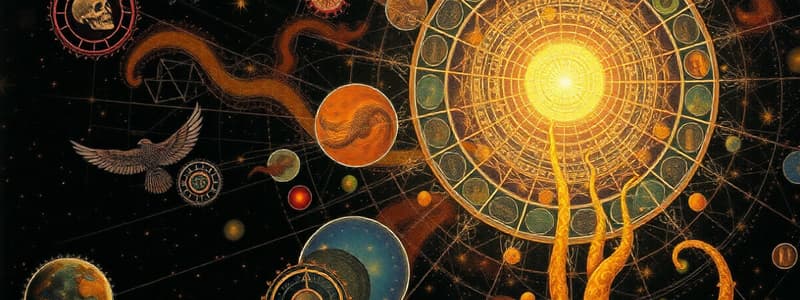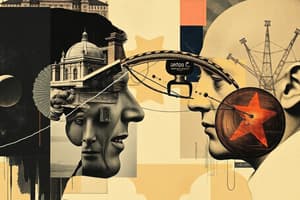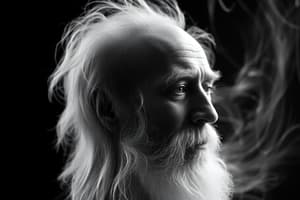Podcast
Questions and Answers
What does psychology primarily study?
What does psychology primarily study?
- Human behavior and mental processes (correct)
- Physical health
- Animal behaviors
- Natural sciences
What do the nature and nurture concepts refer to in psychology?
What do the nature and nurture concepts refer to in psychology?
- Societal norms and genetic predisposition
- Biological makeup and cultural influences
- Inherited traits and upbringing experiences (correct)
- Emotional responses and cognitive processes
Who is associated with the concept of the collective unconscious?
Who is associated with the concept of the collective unconscious?
- B.F. Skinner
- Carl Gustav Jung (correct)
- Sigmund Freud
- William James
Which of the following concepts represents an individual's perception of their ideal state?
Which of the following concepts represents an individual's perception of their ideal state?
What does self-efficacy refer to in psychology?
What does self-efficacy refer to in psychology?
Which self-concept refers to the discrepancy between who one is and who one believes they should be?
Which self-concept refers to the discrepancy between who one is and who one believes they should be?
In social cognitive theory, what is modeling?
In social cognitive theory, what is modeling?
What is the term for a self that is often a façade or misrepresentation of the true self?
What is the term for a self that is often a façade or misrepresentation of the true self?
Flashcards
Nature vs. Nurture
Nature vs. Nurture
The ongoing debate about whether our behavior is primarily shaped by our genes (nature) or our experiences and environment (nurture).
Collective Unconscious
Collective Unconscious
A universal, inherited reservoir of unconscious psychic material shared by all humans, according to Carl Jung.
Archetypes
Archetypes
Universal, unconscious, and primordial patterns of behavior, images, or ideas that are inherited and shared by all humans, according to Carl Jung.
I Self
I Self
Signup and view all the flashcards
Me Self
Me Self
Signup and view all the flashcards
Real Self
Real Self
Signup and view all the flashcards
Ideal Self
Ideal Self
Signup and view all the flashcards
Self-Efficacy
Self-Efficacy
Signup and view all the flashcards
Study Notes
Understanding the Self - Lesson 4
- Psyche: The soul
- Psychology: The study of human behavior and mental processes
- 4 Goals of Psychology: Describe, Explain, Predict, and Control human behavior
- Nature-Nurture Controversy: Both nature (genetics) and nurture (environment) influence behavior
Carl Gustav Jung
- Analytical Psychology: Theory that certain phenomena or situations influence everyone's lives
- Collective Unconscious: A segment of unconscious ideas, deeply rooted in the mind, that are shared by all people, which include archetypes.
Archetypes
- Persona: The mask we show the world
- Shadow: The dark side, containing repressed negative qualities
- Anima: Irrational mood and feeling
- Animus: Men have illogical opinions and irrational thinking that are feminine, masculine side of women
- Great Mother: Archetype symbolizing fertility and destruction;
- Wise Old Man: symbolizes wisdom and meaning pre-existing knowledge and mysteries in life.
- Hero: An unconscious image of a person who conquers their enemies.
- Self: The highest form of archetype; wholeness and completeness within the self
William James
- Father of American Psychology
- Theory of Self: The I self (Pure Ego) and the Me self (empirical self)
- I-self (Pure Ego): The self that knows who we are and what we have done
- Me-self (empirical self): The separate object or individual that the person refers to when describing or discussing their personal experiences
Me-Self Components
- Material Self: Possessions and things that belong to the person
- Social self: How we interact with others
- Spiritual Self: Highest form, the state of being at peace
Self in Western and Eastern Thought (Lesson 5)
- Individualism: The value of the individual is emphasized over group identity. This idea is predominant in western cultures.
- Collectivism: The importance of the group is valued above individual needs in eastern cultures.
Confucianism (Lesson 6)
- Ethical philosophy: Central to Chinese thought, emphasizing ethical principles
- Ren: The wholeness of humanity, human goodness and love
- Li: Proper conduct, shaping social harmony
- Xiao: Respect for elders and ancestors
- Yi: Justice, righteousness, decision-making
Studying That Suits You
Use AI to generate personalized quizzes and flashcards to suit your learning preferences.
Related Documents
Description
Explore the concepts of self through the lens of psychology in this lesson. Learn about Carl Gustav Jung's theories, including archetypes like the Persona, Shadow, and Great Mother. Understand how the nature-nurture debate shapes human behavior and the key goals of psychology.




